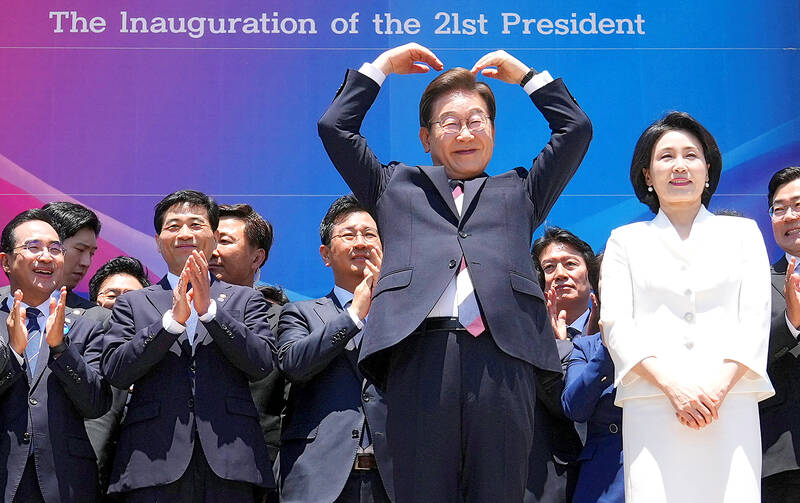South Korea’s new liberal president, Lee Jae-myung, yesterday pledged to raise the country from what he described as the near destruction caused by a martial law attempt and revive a struggling economy facing global protectionism.
Lee’s decisive victory in Tuesday’s snap election stands to usher in a sea change in Asia’s fourth-largest economy, after backlash against a botched attempt at military rule brought down Yoon Suk-yeol just three years into his troubled presidency.
He faces what could be the most daunting set of challenges for a South Korean leader in nearly three decades, ranging from healing a country deeply scarred by the martial law attempt to tackling unpredictable protectionist moves by the US, a major trading partner and a security ally.

Photo: Reuters
“A Lee Jae-myung government will be a pragmatic pro-market government,” he said after taking the oath of office at parliament, a location where six months ago he jumped over the perimeter wall to enter the chamber and avoid martial law troops barricading it to vote down the decree.
He promised deregulation to spur innovation and growth in business, and pledged to reopen dialogue with North Korea while maintaining a strong security alliance with the US.
“It is better to win without fighting than to win in a fight, and peace with no need to fight is the best security,” he said, referring to his country’s often violent relations with rival North Korea.
Lee was officially confirmed earlier as president by the National Election Commission and immediately assumed the powers of the presidency and commander in chief, speaking with the top military leader to receive a report on defense posture.
With all the ballots counted, Lee won 49.42 percent of the nearly 35 million votes cast, while conservative rival Kim Moon-soo took 41.15 percent in the polls, the highest turnout for a presidential election since 1997, official data showed.
Lee has said he would address urgent economic challenges facing the country on the first day in office with a focus on the cost-of-living concerns affecting middle and low-income families and the struggles of small business owners.
“With democracy alive, I hope the president will revive the economy, and have consideration for underprivileged citizens and small business owners,” said Kim Eun-kyung, 58, a Seoul resident.
The new president also faces a deadline set by the White House on negotiating import duties that Washington has blamed for a large trade imbalance between the countries.

Right-wing political scientist Laura Fernandez on Sunday won Costa Rica’s presidential election by a landslide, after promising to crack down on rising violence linked to the cocaine trade. Fernandez’s nearest rival, economist Alvaro Ramos, conceded defeat as results showed the ruling party far exceeding the threshold of 40 percent needed to avoid a runoff. With 94 percent of polling stations counted, the political heir of outgoing Costa Rican President Rodrigo Chaves had captured 48.3 percent of the vote compared with Ramos’ 33.4 percent, the Supreme Electoral Tribunal said. As soon as the first results were announced, members of Fernandez’s Sovereign People’s Party

MORE RESPONSIBILITY: Draftees would be expected to fight alongside professional soldiers, likely requiring the transformation of some training brigades into combat units The armed forces are to start incorporating new conscripts into combined arms brigades this year to enhance combat readiness, the Executive Yuan’s latest policy report said. The new policy would affect Taiwanese men entering the military for their compulsory service, which was extended to one year under reforms by then-president Tsai Ing-wen (蔡英文) in 2022. The conscripts would be trained to operate machine guns, uncrewed aerial vehicles, anti-tank guided missile launchers and Stinger air defense systems, the report said, adding that the basic training would be lengthened to eight weeks. After basic training, conscripts would be sorted into infantry battalions that would take

GROWING AMBITIONS: The scale and tempo of the operations show that the Strait has become the core theater for China to expand its security interests, the report said Chinese military aircraft incursions around Taiwan have surged nearly 15-fold over the past five years, according to a report released yesterday by the Democratic Progressive Party’s (DPP) Department of China Affairs. Sorties in the Taiwan Strait were previously irregular, totaling 380 in 2020, but have since evolved into routine operations, the report showed. “This demonstrates that the Taiwan Strait has become both the starting point and testing ground for Beijing’s expansionist ambitions,” it said. Driven by military expansionism, China is systematically pursuing actions aimed at altering the regional “status quo,” the department said, adding that Taiwan represents the most critical link in China’s

‘REALLY PROUD’: Nvidia would not be possible without Taiwan, Huang said, adding that TSMC would be increasing its capacity by 100 percent Nvidia Corp CEO Jensen Huang (黃仁勳) on Saturday praised and lightly cajoled his major Taiwanese suppliers to produce more to help power strong demand for artificial intelligence (AI), capping a visit to the country of his birth, where he has been mobbed by adoring fans at every step. Speaking at an impromptu press conference in the rain outside a Taipei restaurant, where he had hosted suppliers for a “trillion-dollar dinner,” named after the market capitalization of those firms attending, Huang said this would be another good year for business. “TSMC needs to work very hard this year because I need a lot